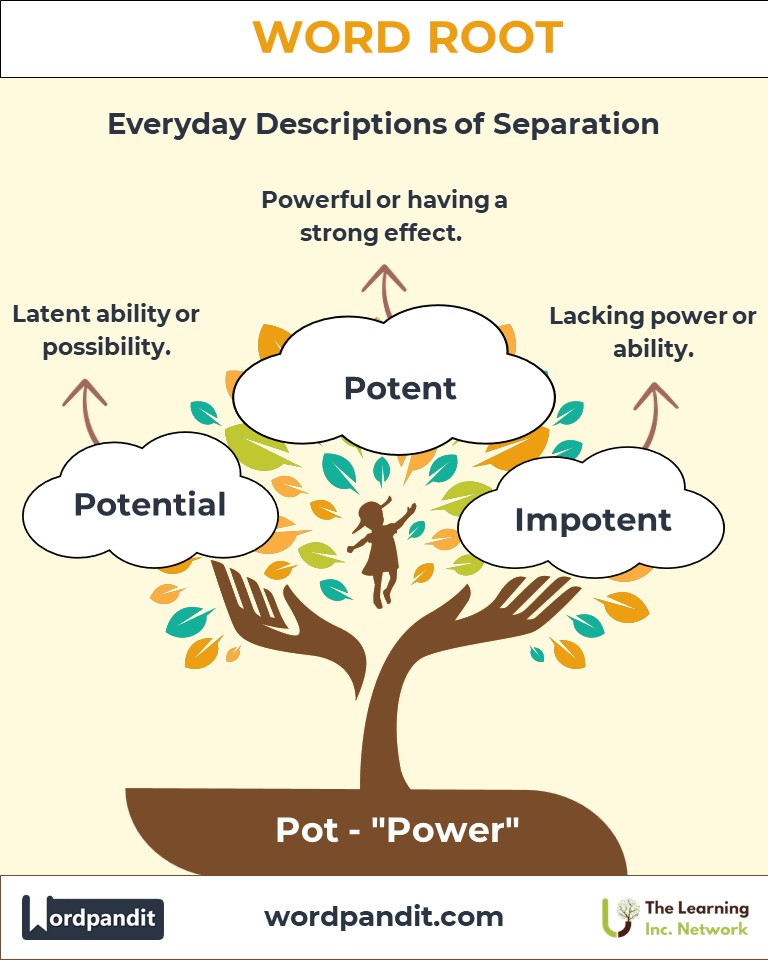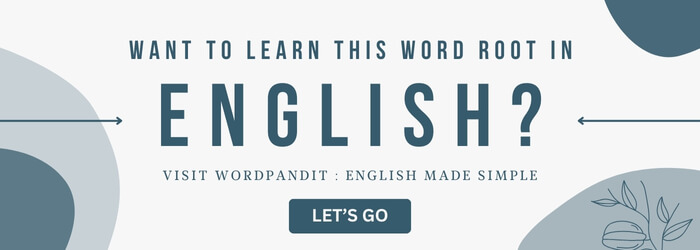Pot: The Root of Power Across Language and Expression
Discover the significance of the root "pot," derived from the Latin "potentia," meaning "power" or "ability." From everyday words like "potential" to profound terms like "potentate," this root underscores strength, capability, and influence in both personal and global contexts.

Table of Contents
- Introduction: The Essence of "Pot"
- Etymology and Historical Journey
- Mnemonic: Unlocking the Power of "Pot"
- Common "Pot"-Related Terms
- "Pot" Through Time
- "Pot" in Specialized Fields
- Illustrative Story: "Pot" in Action
- Cultural Significance of the "Pot" Root
- The "Pot" Family Tree
- FAQs about the "Pot" Word Root
- Test Your Knowledge: "Pot" Mastery Quiz
- Conclusion: The Living Legacy of "Pot"
Introduction: The Essence of "Pot"
The root "pot," pronounced as "poh-t," originates from the Latin word "potentia," meaning "power" or "ability." Whether it’s unlocking potential or asserting dominance, the root "pot" speaks to the essence of strength and capability.

Etymology and Historical Journey
The root "pot" stems from the Latin "potentia," evolving from "potens," meaning "powerful." Over centuries, it entered English through Old French, expanding its meaning to encompass both physical and metaphorical strength.
Mnemonic: Unlocking the Power of "Pot"
To remember "pot," think of a pot brimming with energy and possibility.
Mnemonic Device: "Pot" holds the power—like a potential-filled cauldron of capability!
Common "Pot"-Related Terms
- Potential: Latent ability or possibility. Example: "Every child has the potential to achieve greatness."
- Potent: Powerful or having a strong effect. Example: "The medicine was potent enough to alleviate the symptoms immediately."
- Potentate: A person with great power, often a ruler. Example: "The potentate commanded loyalty from all his subjects."
- Omnipotent: All-powerful, typically used in religious or philosophical contexts. Example: "Many faiths describe their deity as omnipotent."
- Impotent: Lacking power or ability. Example: "The storm rendered the city powerless and impotent against nature’s fury."
"Pot" Through Time
- Potens (Latin): Originally described those in positions of political or social power.
- Potential (Modern): Transitioned from describing physical ability to broader capacities.
- Potentate (Medieval Usage): A title for monarchs or rulers, reflecting centralized power.
"Pot" in Specialized Fields
- Philosophy: Omnipotent—used in theological debates about divine power.
- Medicine: Potent—describes the strength or efficacy of drugs and treatments.
- Business & Leadership: Potential—emphasizes untapped abilities in employees or markets.
Illustrative Story: "Pot" in Action
Once, in a small kingdom, a young boy named Leo was often overlooked due to his quiet nature. However, an old sage recognized Leo’s potential, teaching him the skills to become a wise leader. When the kingdom faced a crisis, it was Leo’s latent power and newfound wisdom that saved his people.
Cultural Significance of the "Pot" Root
From rulers (potentates) shaping civilizations to the philosophical idea of omnipotence, the root "pot" connects deeply to themes of capability and strength. Even in modern times, discussions about unlocking potential resonate across industries and personal development practices.

The "Pot" Family Tree
- Poss (Latin: "to be able"):
- Possible: Capable of being achieved. Example: "With effort, anything is possible."
- Dyn (Greek: "power"):
- Dynamic: Characterized by constant change and activity. Example: "She had a dynamic personality that energized the team."
- Crac (Greek: "rule, power"):
- Autocrat: A ruler with absolute power. Example: "The autocrat ruled with an iron
FAQs About the "Pot" Word Root
Q: What does "Pot" mean, and where does it come from?
A: The root "pot" comes from the Latin word potentia, meaning "power" or "ability." It conveys the idea of strength, influence, or capacity to achieve something, whether physical, mental, or metaphorical. This root is central to words like "potential," "potent," and "omnipotent," which highlight various aspects of power and ability.
Q: How does "potential" differ from "potent"?
A: "Potential" refers to something that is latent or possible—it exists as a capability that may not yet be realized. For example, a seed has the potential to grow into a tree. On the other hand, "potent" describes something that already possesses strength or effectiveness, such as a potent medicine that immediately delivers results.
Q: What is the meaning of "omnipotent," and where is it commonly used?
A: "Omnipotent" means "all-powerful" and is most commonly used in theological or philosophical contexts to describe an entity, such as a deity, that has unlimited power and control over everything. For instance, many religions attribute omnipotence to their gods, emphasizing their ability to create and govern the universe.
Q: What does "impotent" mean, and why does it seem negative?
A: "Impotent" refers to a lack of power, ability, or effectiveness. While it literally means "not potent," the word often carries a negative connotation because it highlights incapacity or weakness. For instance, an "impotent government" might be criticized for failing to address important issues effectively.
Q: Who or what is a "potentate"?
A: A "potentate" is a person who holds great power, often a monarch or ruler. Historically, the term was used to describe kings, emperors, or leaders who wielded significant authority. While its usage has diminished in modern contexts, it is still employed to evoke the grandeur of past rulers or in ceremonial contexts.
Q: Why is "pot" such a versatile root in language?
A: The root "pot" is versatile because the concept of power and ability applies to a wide range of contexts, from describing human potential and strength (e.g., "potential," "potent") to defining positions of influence (e.g., "potentate"). Its adaptability reflects how central the ideas of capability and influence are to human experiences.
Test Your Knowledge: "Pot" Word Root Quiz
1. What does the root "pot" signify?
2. Which word means "all-powerful"?
3. What does "potential" describe?
4. Which term describes a powerful ruler?
5. What does "impotent" mean?
Conclusion: The Living Legacy of "Pot"
The root "pot" symbolizes strength and capability across disciplines and time periods. Its presence in words like "potential" and "potent" reminds us of the power within us all to grow and influence. As we continue to explore new horizons, the legacy of "pot" remains a guiding force in language and life.














